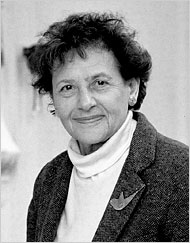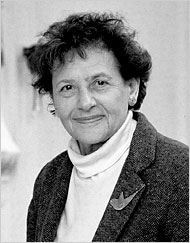Miriam Friedlander represented the City Council district in New York City's Lower East Side and Chinatown from 1974 to 1991.
~ ~ ~ ~ ~ ~ ~ ~ ~ ~ ~ ~ ~ ~ ~ ~ ~ ~ ~ ~
Miriam Friedlander, Former Councilwoman, Dies at 95
Miriam Friedlander, whose socialist politics and advocacy on behalf of women, tenants, gay men and lesbians, and people with AIDS were hallmarks of her nearly two decades of service on the City Council as a representative of the East Village and the Lower East Side, died on Sunday [October 4, 2009] at NYU Langone Medical Center. She was 95
The death was confirmed by the office of Councilwoman Rosie Mendez, who (in 2009) represent(ed) much of the area that Ms Friedlander represented, from 1974 to 1991.
Ms Friedlander was a Manhattan Democrat, but her politics were usually to the left of her fellow party-members. She proudly boasted that she clashed with all three of the Democratic mayors — Abraham D Beame, Edward I Koch and David N Dinkins — who overlapped with her tenure
"She was an old-time Marxist, a member of the Bronx Communist party, of which she was very proud — she never flinched," Mr Koch said in a phone interview on Wednesday. "She was responsible for the opening of a number of shelters for abused women and children"
Mr Koch, who often clashed with Ms Friedlander quite publicly, called her "misguided in her political judgments," but he said he "admired her intensity in getting things done for her community." He added, "I think there's a place for her in heaven"
Born in Pittsburgh in April 1914, Ms Friedlander moved as a child to the Bronx and then Manhattan. Her brother Paul died fighting for the Republican side in the Spanish Civil War in 1938, according to a profile published last year in The Villager, a community newspaper
Ms Friedlander studied at New York University and got involved in modern dance — as well as leftist politics. By the early 1960s, she had become a well-known political figure; in 1962, during the Kennedy administration, and not long after the height of the McCarthy-era anti-Communist scare, she was ordered to register as a member of the Communist Party
In 1973, Ms Friedlander won the Democratic primary for the Second Council District, which then included SoHo, Chinatown, the East Village and the Lower East Side, by a mere 48 votes, defeating four opponents. She had to defend her seat the next year, because of a court-ordered legislative reapportionment
This time, she defeated a lawyer named Sheldon Silver, who would become something of an archrival in the years to come, by just 95 votes. (Mr. Silver later was elected to the State Assembly, where he is now [in 2009] the powerful and longstanding speaker)
On the City Council, Ms Friedlander stayed close to the leftist traditions of her district, even as the district's demographics changed
After the August 1988 riots in Tompkins Square Park, in which the police clashed with homeless squatters, Ms Friedlander supported plans to clear the park while offering social services to the people who had spent their evenings there
"A lot of people want the park back in balance," a 1989 article in The New York Times quoted her as saying. "It was getting out of whack. Day care centers could not go into the park because of the increase in drug trade, drugs were moving in under cover of the homeless. We want to make the park a full community park"
Eventually, Ms Friedlander faced a challenge from a young, more politically moderate lawyer, Antonio Pagán. The two clashed over where to locate AIDS residences and how to deal with squatters, and the decision by her allies to oust a community school superintendent, William E Ubinas, who was a friend of Mr Pagán but an opponent of Ms Friedlander
Mr Pagán narrowly unseated Ms Friedlander by 121 votes out of 12,000 in a 1991 primary. When she tried a comeback in 1993, he won by 1,600 votes, with significant support from Orthodox Jews. Mr Pagán died, at age 50, in January 2009
"She was very progressive, an outspoken advocate for tenants and a sure ‘yes' vote on the City Council for gay rights," Ms Mendez, the current councilwoman, said in a phone interview on Wednesday. As a tenant organizer in Williamsburg, Brooklyn, Ms Mendez worked on Ms Friedlander's unsuccessful campaigns in 1991 and 1993
"She had strong beliefs and ideas and was not shy to let anyone know those opinions," Ms Mendez, who is openly gay, said. "I consider myself lucky that I got to know her, campaign with her and get her support"
William K Dobbs, a longtime gay activist who got to know Ms Friedlander in the 1970s and 1980s, described her as a strong, and early, advocate of gay rights
"When she made a point, it was a physical action," he said in a phone interview. "She'd pull her arm back and crook her elbow. She was a real brawler as a politician, and she fought fiercely in what she believed in."
Ms Friedlander's marriage to Mark Friedlander ended in divorce. She is survived by a son, Paul D Friedlander, a professor of music who directs the music industry program at California State University at Chico.
[Source: (adapted from) The New York Times, City Room, October 8, 2009, By SEWELL CHAN // Neal Boenzi/The New York Times]
Miriam Friedlander represented the City Council district in New York City's Lower East Side and Chinatown from 1974 to 1991.
~ ~ ~ ~ ~ ~ ~ ~ ~ ~ ~ ~ ~ ~ ~ ~ ~ ~ ~ ~
Miriam Friedlander, Former Councilwoman, Dies at 95
Miriam Friedlander, whose socialist politics and advocacy on behalf of women, tenants, gay men and lesbians, and people with AIDS were hallmarks of her nearly two decades of service on the City Council as a representative of the East Village and the Lower East Side, died on Sunday [October 4, 2009] at NYU Langone Medical Center. She was 95
The death was confirmed by the office of Councilwoman Rosie Mendez, who (in 2009) represent(ed) much of the area that Ms Friedlander represented, from 1974 to 1991.
Ms Friedlander was a Manhattan Democrat, but her politics were usually to the left of her fellow party-members. She proudly boasted that she clashed with all three of the Democratic mayors — Abraham D Beame, Edward I Koch and David N Dinkins — who overlapped with her tenure
"She was an old-time Marxist, a member of the Bronx Communist party, of which she was very proud — she never flinched," Mr Koch said in a phone interview on Wednesday. "She was responsible for the opening of a number of shelters for abused women and children"
Mr Koch, who often clashed with Ms Friedlander quite publicly, called her "misguided in her political judgments," but he said he "admired her intensity in getting things done for her community." He added, "I think there's a place for her in heaven"
Born in Pittsburgh in April 1914, Ms Friedlander moved as a child to the Bronx and then Manhattan. Her brother Paul died fighting for the Republican side in the Spanish Civil War in 1938, according to a profile published last year in The Villager, a community newspaper
Ms Friedlander studied at New York University and got involved in modern dance — as well as leftist politics. By the early 1960s, she had become a well-known political figure; in 1962, during the Kennedy administration, and not long after the height of the McCarthy-era anti-Communist scare, she was ordered to register as a member of the Communist Party
In 1973, Ms Friedlander won the Democratic primary for the Second Council District, which then included SoHo, Chinatown, the East Village and the Lower East Side, by a mere 48 votes, defeating four opponents. She had to defend her seat the next year, because of a court-ordered legislative reapportionment
This time, she defeated a lawyer named Sheldon Silver, who would become something of an archrival in the years to come, by just 95 votes. (Mr. Silver later was elected to the State Assembly, where he is now [in 2009] the powerful and longstanding speaker)
On the City Council, Ms Friedlander stayed close to the leftist traditions of her district, even as the district's demographics changed
After the August 1988 riots in Tompkins Square Park, in which the police clashed with homeless squatters, Ms Friedlander supported plans to clear the park while offering social services to the people who had spent their evenings there
"A lot of people want the park back in balance," a 1989 article in The New York Times quoted her as saying. "It was getting out of whack. Day care centers could not go into the park because of the increase in drug trade, drugs were moving in under cover of the homeless. We want to make the park a full community park"
Eventually, Ms Friedlander faced a challenge from a young, more politically moderate lawyer, Antonio Pagán. The two clashed over where to locate AIDS residences and how to deal with squatters, and the decision by her allies to oust a community school superintendent, William E Ubinas, who was a friend of Mr Pagán but an opponent of Ms Friedlander
Mr Pagán narrowly unseated Ms Friedlander by 121 votes out of 12,000 in a 1991 primary. When she tried a comeback in 1993, he won by 1,600 votes, with significant support from Orthodox Jews. Mr Pagán died, at age 50, in January 2009
"She was very progressive, an outspoken advocate for tenants and a sure ‘yes' vote on the City Council for gay rights," Ms Mendez, the current councilwoman, said in a phone interview on Wednesday. As a tenant organizer in Williamsburg, Brooklyn, Ms Mendez worked on Ms Friedlander's unsuccessful campaigns in 1991 and 1993
"She had strong beliefs and ideas and was not shy to let anyone know those opinions," Ms Mendez, who is openly gay, said. "I consider myself lucky that I got to know her, campaign with her and get her support"
William K Dobbs, a longtime gay activist who got to know Ms Friedlander in the 1970s and 1980s, described her as a strong, and early, advocate of gay rights
"When she made a point, it was a physical action," he said in a phone interview. "She'd pull her arm back and crook her elbow. She was a real brawler as a politician, and she fought fiercely in what she believed in."
Ms Friedlander's marriage to Mark Friedlander ended in divorce. She is survived by a son, Paul D Friedlander, a professor of music who directs the music industry program at California State University at Chico.
[Source: (adapted from) The New York Times, City Room, October 8, 2009, By SEWELL CHAN // Neal Boenzi/The New York Times]
Sponsored by Ancestry
Advertisement
See more Friedlander or Sigel memorials in:
- Saint Marks Church-In-The-Bowery Churchyard Friedlander or Sigel
- Manhattan Friedlander or Sigel
- New York County Friedlander or Sigel
- New York Friedlander or Sigel
- USA Friedlander or Sigel
- Find a Grave Friedlander or Sigel
Advertisement





